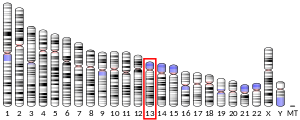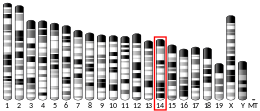^ a b c GRCh38: Ensembl release 89: ENSG00000102804 – Ensembl , May 2017^ a b c GRCm38: Ensembl release 89: ENSMUSG00000022010 – Ensembl , May 2017^ "Human PubMed Reference:" . National Center for Biotechnology Information, U.S. National Library of Medicine .^ "Mouse PubMed Reference:" . National Center for Biotechnology Information, U.S. National Library of Medicine .^ Jay P, Ji JW, Marsollier C, Taviaux S, Berge-Lefranc JL, Berta P (Jul 1996). "Cloning of the human homologue of the TGF beta-stimulated clone 22 gene". Biochem Biophys Res Commun . 222 (3): 821– 6. doi :10.1006/bbrc.1996.0825 . PMID 8651929 . ^ Ohta S, Shimekake Y, Nagata K (Mar 1997). "Molecular cloning and characterization of a transcription factor for the C-type natriuretic peptide gene promoter" . Eur J Biochem . 242 (3): 460– 6. doi :10.1111/j.1432-1033.1996.460rr.x PMID 9022669 . ^ "Entrez Gene: TSC22D1 TSC22 domain family, member 1" .^ Kester HA, Blanchetot C, den Hertog J, van der Saag PT, van der Burg B (September 1999). "Transforming growth factor-beta-stimulated clone-22 is a member of a family of leucine zipper proteins that can homo- and heterodimerize and has transcriptional repressor activity" . J. Biol. Chem . 274 (39): 27439– 47. doi :10.1074/jbc.274.39.27439 PMID 10488076 .
Shibanuma M, Kuroki T, Nose K (1992). "Isolation of a gene encoding a putative leucine zipper structure that is induced by transforming growth factor beta 1 and other growth factors" . J. Biol. Chem . 267 (15): 10219– 24. doi :10.1016/S0021-9258(19)50006-0 PMID 1587811 . Dmitrenko VV, Garifulin OM, Shostak EA, et al. (1997). "[The characteristics of different types of mRNA expressed in the human brain]". Tsitol. Genet . 30 (5): 41– 7. PMID 9026990 . Kester HA, Blanchetot C, den Hertog J, et al. (1999). "Transforming growth factor-beta-stimulated clone-22 is a member of a family of leucine zipper proteins that can homo- and heterodimerize and has transcriptional repressor activity" . J. Biol. Chem . 274 (39): 27439– 47. doi :10.1074/jbc.274.39.27439 PMID 10488076 . Hino S, Kawamata H, Uchida D, et al. (2001). "Nuclear translocation of TSC-22 (TGF-beta-stimulated clone-22) concomitant with apoptosis: TSC-22 as a putative transcriptional regulator". Biochem. Biophys. Res. Commun . 278 (3): 659– 64. doi :10.1006/bbrc.2000.3840 . PMID 11095965 . Hino S, Kawamata H, Omotehara F, et al. (2002). "Leucine zipper structure of TSC-22 (TGF-beta stimulated clone-22) markedly inhibits the anchorage-independent growth of salivary gland cancer cells". Oncol. Rep . 9 (2): 371– 4. doi :10.3892/or.9.2.371 . PMID 11836610 . Hino S, Kawamata H, Omotehara F, et al. (2002). "Cytoplasmic TSC-22 (transforming growth factor-beta-stimulated clone-22) markedly enhances the radiation sensitivity of salivary gland cancer cells". Biochem. Biophys. Res. Commun . 292 (4): 957– 63. doi :10.1006/bbrc.2002.6776 . PMID 11944908 . Ohara O, Nagase T, Mitsui G, et al. (2003). "Characterization of size-fractionated cDNA libraries generated by the in vitro recombination-assisted method" . DNA Res . 9 (2): 47– 57. doi :10.1093/dnares/9.2.47 PMID 12056414 . Gupta RA, Sarraf P, Brockman JA, et al. (2003). "Peroxisome proliferator-activated receptor gamma and transforming growth factor-beta pathways inhibit intestinal epithelial cell growth by regulating levels of TSC-22" . J. Biol. Chem . 278 (9): 7431– 8. doi :10.1074/jbc.M208076200 PMID 12468551 . Strausberg RL, Feingold EA, Grouse LH, et al. (2003). "Generation and initial analysis of more than 15,000 full-length human and mouse cDNA sequences" . Proc. Natl. Acad. Sci. U.S.A . 99 (26): 16899– 903. Bibcode :2002PNAS...9916899M . doi :10.1073/pnas.242603899 PMC 139241 PMID 12477932 . Sugawara F, Yamada Y, Watanabe R, et al. (2004). "The role of the TSC-22 (-396) A/G variant in the development of diabetic nephropathy". Diabetes Res. Clin. Pract . 60 (3): 191– 7. doi :10.1016/S0168-8227(03)00038-X . PMID 12757981 . Uchida D, Omotehara F, Nakashiro K, et al. (2003). "Posttranscriptional regulation of TSC-22 (TGF-beta-stimulated clone-22) gene by TGF-beta 1". Biochem. Biophys. Res. Commun . 305 (4): 846– 54. doi :10.1016/S0006-291X(03)00854-4 . PMID 12767908 . Gerhard DS, Wagner L, Feingold EA, et al. (2004). "The status, quality, and expansion of the NIH full-length cDNA project: the Mammalian Gene Collection (MGC)" . Genome Res . 14 (10B): 2121– 7. doi :10.1101/gr.2596504 . PMC 528928 PMID 15489334 . Choi SJ, Moon JH, Ahn YW, et al. (2005). "Tsc-22 enhances TGF-beta signaling by associating with Smad4 and induces erythroid cell differentiation". Mol. Cell. Biochem . 271 (1– 2): 23– 8. doi :10.1007/s11010-005-3456-7 . PMID 15881652 . S2CID 23414101 . Rentsch CA, Cecchini MG, Schwaninger R, et al. (2006). "Differential expression of TGFbeta-stimulated clone 22 in normal prostate and prostate cancer" . Int. J. Cancer . 118 (4): 899– 906. doi :10.1002/ijc.21449 PMID 16106424 . S2CID 44422160 . Stelzl U, Worm U, Lalowski M, et al. (2005). "A human protein-protein interaction network: a resource for annotating the proteome" . Cell . 122 (6): 957– 68. doi :10.1016/j.cell.2005.08.029 hdl :11858/00-001M-0000-0010-8592-0 PMID 16169070 . Ewing RM, Chu P, Elisma F, et al. (2007). "Large-scale mapping of human protein-protein interactions by mass spectrometry" . Mol. Syst. Biol . 3 (1): 89. doi :10.1038/msb4100134 . PMC 1847948 PMID 17353931 . Lu Y, Kitaura J, Oki T, et al. (2007). "Identification of TSC-22 as a potential tumor suppressor that is upregulated by Flt3-D835V but not Flt3-ITD". Leukemia . 21 (11): 2246– 57. doi :10.1038/sj.leu.2404883 . PMID 17690703 . S2CID 2787939 .




